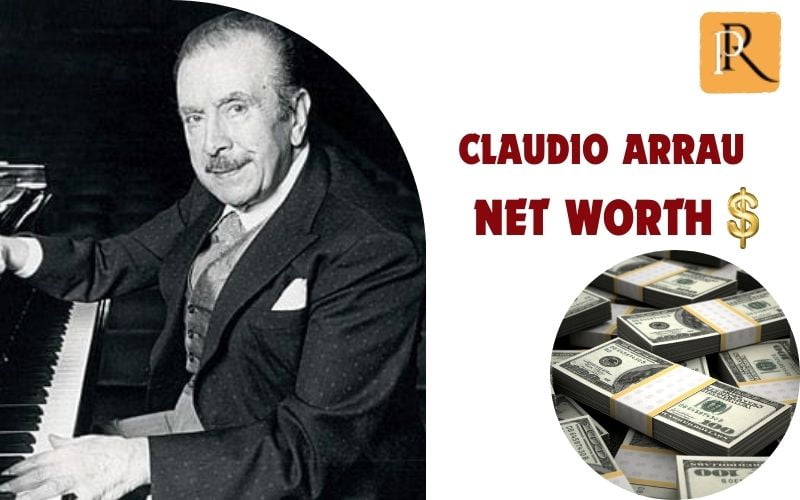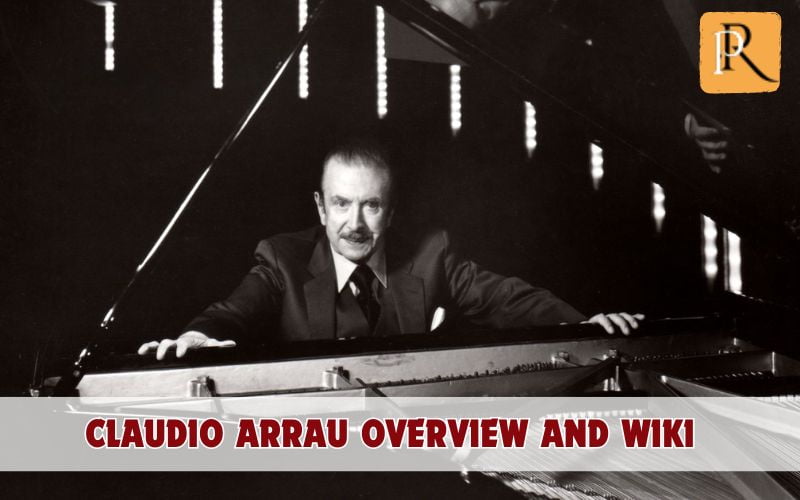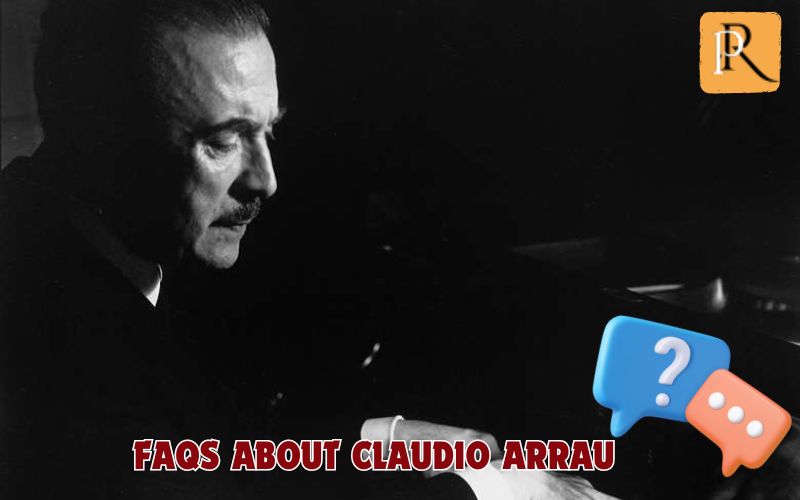Claudio Arrau, known for his profound impact on the world of classical music, continues to fascinate music enthusiasts and historians alike. While many admire his technical skills and emotional performances, curiosity about his financial legacy is growing.
What is Claudio Arrau’s net worth? This article delves into the pianist’s net worth, providing a glimpse into the economic side of his illustrious career.
Quick information
| TRUTH | DETAIL |
|---|---|
| Real name | Claudio Arrau Leon |
| Popular name | Claudio Arrau |
| Sex | male |
| Date of birth | February 6, 1903 |
| Age at death | 88 (Died June 9, 1991) |
| Parents | Carlos Arrau (Father), Lucrecia León Bravo de Villalba (Mother) |
| Siblings | Sister: Lucrecia |
| Place of birth | Chillan, Chile |
| Nationality | Chilean, American (Dual Citizenship) |
| Nation | Chilean |
| Education | Stern Conservatory, Berlin (under the direction of Martin Krause) |
| Marital status | Married |
| Sexual orientation | Straight |
| Wife/Wife/husband | Ruth Schneider (m. 1937), Erika Burkewitch (m. 1929–1933) |
| Children | Christopher, Mario, Carmen, Klaudio |
| Dating | do not apply |
| Net value | do not apply |
| Origin of wealth | Concert performances, Music recordings |
| Year of operation | 1908–1991 |
| Category | Classic music |
| Height | do not apply |
What is Claudio Arrau’s net worth in 2024?

While Claudio Arrau is famous for his breathtaking piano performances and an illustrious career that spans decades, the exact amount of his net worth is not publicly available.
However, when compared with contemporaries such as Wilhelm Kempff and Leonard Bernstein, it is clear that Arrau’s financial legacy could be significant, given his lasting influence and the legacy of his recordings. .
Kempff and Bernstein, both key figures in their respective fields, also amassed significant wealth through their musical careers.
Bernstein, with his broader involvement in composing and conducting, along with Kempff’s famous interpretations of Beethoven, both enjoyed lucrative careers comparable to their recording and concert sales. Arrau.
Claudio Arrau Overview and Wiki

Early life and education
Born into a non-musical family in Chillán, Claudio Arrau was a child prodigy, reading music before words. His early exposure to piano, taught by his mother, paved the way for him to become a prodigy.
By age 5, he was performing in public, an impressive achievement that led to the government granting him permission to study in Germany. His studies under Martin Krause at the Stern Conservatory laid the foundational expertise that has come to define his musical technique and style.
An extraordinary beginning
Claudio Arrau’s journey into music began in his hometown of Chillán, Chile. Recognized as a child prodigy, Arrau performed Beethoven’s sonatas at the age of four.
His extraordinary talent attracted the attention of the Chilean government, which granted him a grant to study in Germany – a pivotal move that shaped his future career.
European training and early career
In Berlin, Arrau studied at the prestigious Stern Conservatory under Martin Krause, a disciple of legendary composer Franz Liszt. This mentorship was important because Krause instilled in Arrau a deep foundation in the romantic tradition of piano playing.
His first important performances in Europe laid the foundation for his reputation as a proficient interpreter of classical and romantic repertoire.
Global recognition
The 1930s marked a period of great growth in Arrau’s career. He embarked on ambitious projects, including performing the complete keyboard works of Johann Sebastian Bach and the complete piano sonatas of Ludwig van Beethoven. These performances were not only technical feats but also interpretations that won him international acclaim.
Expanded repertoire and recordings
Arrau’s repertoire is extensive, including works by Chopin, Schubert, Mozart and Brahms. His recording career began in the 1930s with the Aeolian Company and later with major labels such as Philips and EMI.
His recordings are highly regarded for their depth and sensitivity, especially his interpretations of Beethoven and Chopin.
The years that followed and the legacy
Throughout his life, Arrau maintained a rigorous performance schedule, traveling the world and sharing his music until the late 80s. His influence extended beyond his performances and recordings. minus; he was also a respected teacher and mentor to many young pianists.
Arrau’s approach to music was characterized by a deep intellectual and emotional understanding, qualities that made him one of the most respected classical musicians of the 20th century.
Innovative techniques and philosophical approaches
Arrau’s technique is noted for its clarity, precision, and expressive depth. He believes in staying true to the composer’s intention while enlivening a work with personal interpretation. His performances are often described as transcendent, blending meticulous craftsmanship with deep emotional understanding.
Social media accounts
- Facebook: Not applicable
- Twitter: Not applicable
- Instagram: Not applicable
- YouTube: Not applicable
Frequently asked questions about Claudio Arrau

Who is Claudio Arrau?
He is a Chilean-American pianist known for his profound, introspective interpretations and rich repertoire that spans Baroque to 20th-century composers.
What is notable about Arrau’s early musical education?
Recognized as a child prodigy, Arrau performed in public at the age of five and was sent to study in Berlin at age nine, under the guidance of Martin Krause, a student of Franz Liszt.
Which composers did Arrau particularly excel at interpreting?
He is noted for his exceptional interpretations of Beethoven, Liszt, Chopin, Schumann and Debussy, among others.
Did he have any special musical training?
Yes, his training in Berlin with Martin Krause linked him directly to Beethoven’s teachings through a generation of students and teachers.
What are some of Claudio Arrau’s most famous recordings?
His recordings include the complete piano sonatas of Beethoven and Mozart, as well as important works by Schubert, Brahms and Debussy.
Did he contribute to music education?
Yes, many famous pianists studied under him, such as Garrick Ohlsson and Roberto Szidon.
What awards has he received throughout his career?
He has received many awards including the UNESCO International Music Award and the Chilean National Arts Award.
How did he influence the world of music?
In addition to his performances, Arrau influenced the world of music through his deeply philosophical approach to music and teaching, impacting both his audiences and future generations of pianists.
When did Claudio Arrau die?
He died on June 9, 1991 while still active in his concert career.
What is unique about Arrau’s playing style?
He is known for his rich sonic abilities, his deep emotional connection to music, and his preference for slower tempos that emphasize musical expression rather than virtuosic performance.
Did he have any connections to specific musical awards or recognitions later in his life?
That’s right, in his honor, the Robert Schumann Society established the Arrau Medal in 1991, awarded to pianists who demonstrate profound musical ability and depth in their interpretation.
Conclusion
Thank you for accompanying us through the extraordinary life and success of Claudio Arrau. His mastery of the piano has made him one of the best classical piano performers of all time. To discover more about the legacy of Arrau and other music legends, follow Rachelparris.com.
This is where music from the past and present comes alive – bringing you closer to the classics!
Categories: Musician
Source: svlsf.edu.vn
